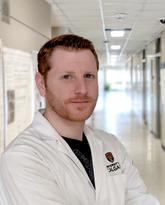
Thibault Allain
Post Doctoral Fellow, Dr. Andre Buret lab, Faculty of Science; Dept. of Biological Science
BSC - Biotechnology and Microbiology
PhD - Microbiology, Bacteriology and Parasitology
Contact information
Biography
Thibault joined the HPI group as an postdoctoral fellow in January 2016. He is working under the supervision of Dr. Andre Buret in the Department of Biological Sciences at the University of Calgary. Previously, Thibault received a Bachelor’s equivalent in biotechnology and microbiology at Pierre and Marie Curie University (Paris-6) and graduated from a Bachelor in biotechnology and molecular biology at University of Cergy-Pontoise. Thibault went on to complete a Master degree in Microbiology and Food Safety at Pierre and Marie Curie University (Paris-6) in 2012. Finally, he graduated with a Doctorate in Microbiology, Bacteriology and Parasitology at AgroParisTech Doctoral School (Paris-Saclay University) in collaboration with INRA institute (Micalis), the National Museum of Natural History and the National Veterinary School of Alfort in 2016.
For over a decade Thibault had the opportunity to explore different aspects of microbiology and parasitology. Before completing a postdoctoral position at University of Calgary studying giardiasis, microbiota and inflammation, his PhD work consisted of looking at the anti-Giardia effects of probiotic strains of lactobacilli and the role of bacterial Bile Salt Hydrolases in this inhibitory effect (INRA, MNHN). Previous work experiences also led Thibault to manage Hygiene and Food Safety in Paris University Hospital for several years. Finally, his early work experiences were focused on environmental microbiology by studying the impact of Cyanobacteria and coliform bacteria in recreational waters at Biotechnology Research Center (McGill University, Montreal) and assessing microbial water quality (Eaux de Paris – Regional laboratory).
Thibaults ’s current project is entitled: “The metabolomic signature of Giardia sp.” Giardia duodenalis is a protozoan parasite responsible for giardiasis, a parasitic disease characterized by intestinal malabsorption, diarrhea, weight loss and abdominal pain. Upon infection, Giardia, which has a minimal biosynthetic capacity, compete locally with the commensal microbiome for nutrients and ecological niches in the duodenum. In this context, Thibault’s work consists of studying the nutritional requirements and the secretome of several Giardia strains in order to characterize their metabolomic profile. Overall his goal is to decipher how Giardia survives the host’s intestinal tract using a metabolomic approach that may further help to understand the impact of nutritional modulation by Giardia trophozoites on the gut microbiome and host physiology.
